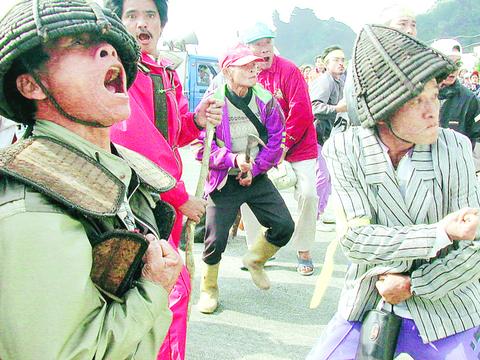Some 300 Tao aborigines staged a protest yesterday at an interim nuclear repository on Orchid Island to press the government to relocate the radioactive waste from their home as soon as possible.
The demonstrators demanded that the government declare that the state-owned Taiwan Power Company's (Taipower) use of the nuclear dump after New Year's Eve is illegal and set a definite time frame for removal of the waste.

PHOTO: LI KUANG-PIN, TAIPEI TIMES
The demonstrators said that if the government fails to respond to their demand within 15 days, they will launch an even larger protest. They ended their demonstration after planting several taro plants at the site to symbolize their claim to the land.
The Tao tribesmen began to converge on the Taipower nuclear dump on Lanyu, located some 42km off Taiwan's southeast coast, early in the morning. While tribal elders wore traditional Tao attire, including silver helmets and long spears, younger Tao people carried posters that read: "Oust nuclear waste! Oppose relocation of residents."
More than 200 policemen were mobilized to maintain order. At one point, some demonstrators threw stones at the policemen, but the clash was soon stopped when Tao elders assisted in controlling the situation.
At present, 97,672 barrels of low-grade radioactive waste from Taipower's three nuclear power plants are stored at the Lanyu nuclear dump.
The Tao demanded that President Chen Shui-bian (陳水扁) honor his campaign promise to relocate the waste during his presidency, which will end May 20, 2004. In recent years, the Tao have staged many large demonstrations to push for prompt removal of the waste.
The Cabinet passed a draft bill last month that outlines legal proceedings to ensure professionalism and information transparency when choosing permanent nuclear dump sites for domestic low-grade radioactive waste. The bill is now awaiting approval of the Legislative Yuan.
Premier Yu Shyi-kun said in mid-December that the government will eventually relocate the nuclear waste, but he added that the government needs to extend the interim land lease with a Tao association until it can find a new location.
Tao tribesmen demanded that certain provisions believed to hinder relocation be revised. Moreover, they are opposed to any extension of the lease contract, which was signed between Taipower and the Tao association in 1982 and will expire by the end of this year.
The demonstrators also de-manded that the government form a high-level negotiation team to discuss the relocation issue with their representatives.

An essay competition jointly organized by a local writing society and a publisher affiliated with the Chinese Communist Party (CCP) might have contravened the Act Governing Relations Between the People of the Taiwan Area and the Mainland Area (臺灣地區與大陸地區人民關係條例), the Mainland Affairs Council (MAC) said on Thursday. “In this case, the partner organization is clearly an agency under the CCP’s Fujian Provincial Committee,” MAC Deputy Minister and spokesperson Liang Wen-chieh (梁文傑) said at a news briefing in Taipei. “It also involves bringing Taiwanese students to China with all-expenses-paid arrangements to attend award ceremonies and camps,” Liang said. Those two “characteristics” are typically sufficient

A magnitude 5.9 earthquake that struck about 33km off the coast of Hualien City was the "main shock" in a series of quakes in the area, with aftershocks expected over the next three days, the Central Weather Administration (CWA) said yesterday. Prior to the magnitude 5.9 quake shaking most of Taiwan at 6:53pm yesterday, six other earthquakes stronger than a magnitude of 4, starting with a magnitude 5.5 quake at 6:09pm, occurred in the area. CWA Seismological Center Director Wu Chien-fu (吳健富) confirmed that the quakes were all part of the same series and that the magnitude 5.5 temblor was

The brilliant blue waters, thick foliage and bucolic atmosphere on this seemingly idyllic archipelago deep in the Pacific Ocean belie the key role it now plays in a titanic geopolitical struggle. Palau is again on the front line as China, and the US and its allies prepare their forces in an intensifying contest for control over the Asia-Pacific region. The democratic nation of just 17,000 people hosts US-controlled airstrips and soon-to-be-completed radar installations that the US military describes as “critical” to monitoring vast swathes of water and airspace. It is also a key piece of the second island chain, a string of

The Central Weather Administration has issued a heat alert for southeastern Taiwan, warning of temperatures as high as 36°C today, while alerting some coastal areas of strong winds later in the day. Kaohsiung’s Neimen District (內門) and Pingtung County’s Neipu Township (內埔) are under an orange heat alert, which warns of temperatures as high as 36°C for three consecutive days, the CWA said, citing southwest winds. The heat would also extend to Tainan’s Nansi (楠西) and Yujing (玉井) districts, as well as Pingtung’s Gaoshu (高樹), Yanpu (鹽埔) and Majia (瑪家) townships, it said, forecasting highs of up to 36°C in those areas